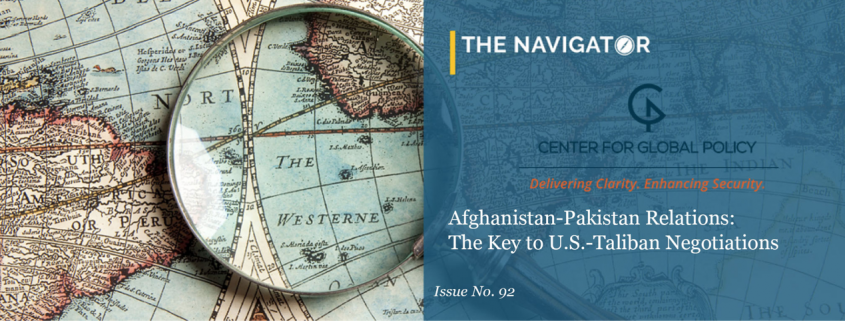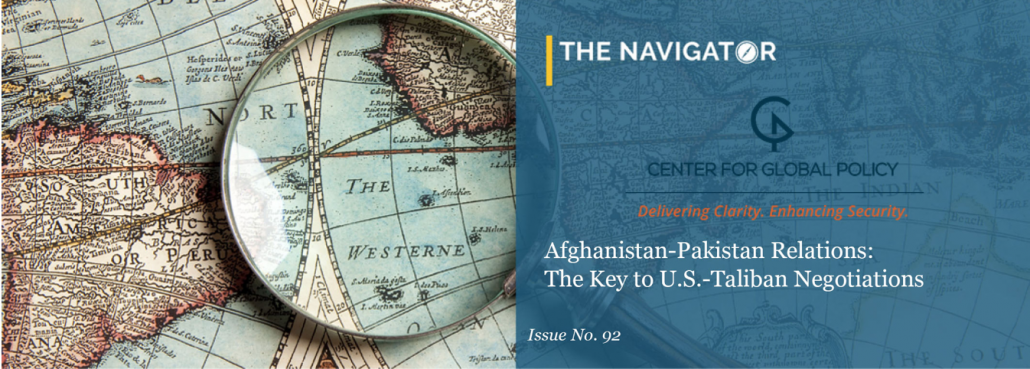Afghanistan-Pakistan Relations: The Key to U.S.-Taliban Negotiations
By Imtiaz Ali
Of all the challenges Washington faces in the Afghan peace process, the continuing strained relationship between Pakistan and Afghanistan has proven to be one of the most difficult. The recent deterioration of relations between the two countries is hindering Washington’s ongoing efforts for a negotiated settlement with the Taliban insurgents after 18 years of conflict. If not addressed, the deep mistrust on both sides of the Durand Line can even paralyze U.S. plans to bring an end to the longest running war in American history. While it tries to negotiate with the Taliban, the Trump administration must also work to mitigate Kabul-Islamabad tensions.
Recent Tensions
The most recent open hostility between Islamabad and Kabul was triggered by comments from Pakistani Prime Minister Imran Khan. He proposed an interim caretaker government to oversee the peace talks and the coming elections in Afghanistan as a possible solution to an apparent deadlock in the U.S.-led peace process with the Taliban. Strongly reacting to these comments, the Afghan government called them a “flagrant interference” in Afghanistan’s internal affairs and, in protest, recalled its envoy from Islamabad. Soon after the flare-up, a meeting of Taliban representatives and Afghan officials scheduled in Qatar was postponed, and the Taliban announced the “spring offensive” – renewing their attacks in the war-ravaged country.
On previous occasions, the United States would either try relieving the tensions or remain silent. However, this time, the U.S. ambassador to Kabul, John Bass, exacerbated the situation when he joined a Twitter war between the countries and criticized Khan’s remarks. In reaction, a Pakistani minister called the U.S. ambassador a “little pygmy and ignorant,” further vexing the already complex relationship among the three countries. Washington’s relations with Afghanistan and Pakistan – separately and jointly – have been challenging for a variety of reasons.
Afghan President Ashraf Ghani’s government has openly shown its unhappiness over Washington’s overtures to the Taliban because Kabul has felt left out of the peace process. In some stunning remarks, Afghan National Security Adviser Hamdullah Mohib openly accused U.S. special envoy Zalmay Khalilzad of sidelining the Afghan government in the peace talks and acting like a “viceroy” because of his personal ambitions. As for Pakistan, the Trump administration initially took a hard line toward Islamabad but changed its approach to express appreciation for Pakistan’s support in the Afghan peace process. In dealing with both countries together, Washington has failed to get them to cooperate on major policy issues.
Lingering Bilateral Mistrust
The relationship between Pakistan and Afghanistan appears to be reactionary, with endless mutual blame games following disruptive incidents on both sides of the border. This is due to the countries’ mutual decades-old deep mistrust. Kabul has held Pakistan largely responsible for the destruction of Afghanistan. The country’s National Directorate of Security (NDS) and top officials blame Pakistan for almost every security issue in Afghanistan. Their principal grievance continues to be that Pakistan supports the Taliban leaders, gives them shelter and uses them to wield influence within Afghanistan. Pakistan denies that it has a hidden agenda in Afghanistan, however, Pakistan’s support for the Taliban is a well-documented charge that Islamabad can hardly deny.
For the Pakistanis, a major point of contention is the refusal of successive Afghan governments to accept the Durand line border. The Durand line was drawn up by the British government in 1893 and imposed on the monarchy that ruled Afghanistan at the time. As part of stronger border management, Islamabad recently fenced the long and porous border despite Kabul’s claims that the fencing would divide the Pashtun families living on both sides of the Durand line. Pakistan also has accused Afghanistan of giving shelter to Pakistani militants and inciting ethnic strife in Pakistan.
Top Afghan officials’ recent statements supporting a Pakistani civil rights group called the Pashtun Tahaffuz Movement (PTM) have aggravated the decades-old paranoia of perceived Pashtun nationalism. Pakistan called Ghani’s tweet in support of the PTM a “gross interference” in Pakistan’s internal affairs. Islamabad fears that Pashtun nationalists and Baluch separatists will get support from Afghanistan and India, respectively, and begin destabilizing the country. Stoking these fears is the developing relationship between Afghanistan and India, which makes Pakistan feel surrounded.
An Uncertain Future
Relations between Pakistan and Afghanistan are fraught with deeply entrenched political positions. Both countries would, however, benefit greatly from even limited peace and stability within Afghanistan. Perhaps avoiding reactionary responses to any unwanted incident would be the first step toward confidence-building measures and more constructive relations. However, that is not likely to happen in the current context, where minor incidents and sometimes even apparently well-intended statements escalate into diplomatic crises.
Recently, Ghani appointed two former intelligence chiefs — Amrullah Saleh and Asadullah Khalid — to consolidate power in local politics. The appointments are also a clear message to Islamabad of Kabul’s new proactive and aggressive strategy because of the men’s harsh anti-Pakistan views. Moreover, things are likely to heat up in the coming Afghan presidential election, scheduled in September this year. Criticizing Islamabad will be a key electoral tool for leading presidential candidates looking to cash in on the widespread anti-Pakistan sentiments.
Another issue that could weaken the Afghani-Pakistani relationship is the rising Pashtun movement in Pakistan, which has generated a lot of interest and support from Pashtuns in Afghanistan. The PTM is a civil rights movement demanding constitutional rights for the Pashtun, who have suffered in the long “war against terror” and are seeking transparency in the disappearances of citizens, extrajudicial killings, and other human rights grievances. However, the Pakistani state is handling it badly, which could create internal problems as well as new tensions with Afghanistan. On one hand, Khan said last week that PTM demands are genuine. Separately, this week Pakistani military spokesman Maj-Gen. Asif Ghafoor not only accused the PTM leadership of receiving funds from Indian and Afghan intelligence agencies but also gave a stern warning to the PTM leaders that they will be no longer tolerated.
The United States is engaged in a highly complicated peace process with the Taliban. Currently, Washington is struggling in its one-on-one talks with the Taliban and is having a hard time getting the jihadist movement to negotiate with its Afghan opponents. The key to an intra-Afghan dialogue is getting Pakistan to nudge the Taliban to engage in serious talks with the current Afghan government. For this to happen though Washington must focus on getting Kabul and Islamabad together.
This article was originally published on The Navigator, the Center for Global Policy.
Imtiaz Ali is a Washington D.C.-based analyst and consultant whose work focuses on political, security, development and media-related issues related to Afghanistan and Pakistan. Ali worked at the State Department’s Foreign Service Institute as a curriculum specialist (2011-15). He has also served as a Jennings Randolph Fellow at the United States Institute of Peace (2009-10), a Yale World Fellow (2008) and a Knight Journalism Fellow at Stanford University (2006-07). Ali has also had a long career in journalism while working in Pakistan for the Washington Post, the BBC, Daily Telegraph, and Pakistani newspapers, The News and Dawn. He tweets at @imtiaz999. The views expressed herein are the author’s and do not necessarily reflect those of CGP.

















2019
1,008 views
views
0
comments